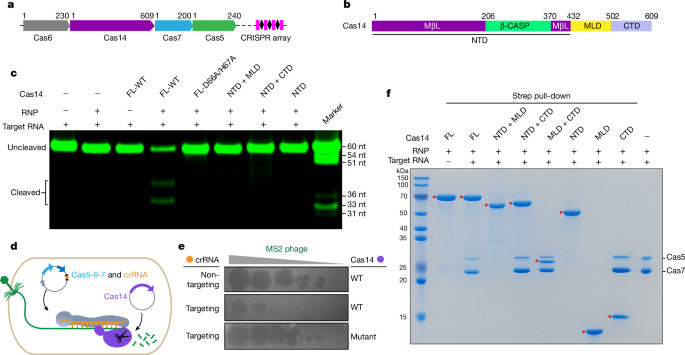Altae-Tran, H. et al. Uncovering the functional diversity of rare CRISPR-Cas systems with deep terascale clustering. Science 382, eadi1910 (2023).
Hille, F. et al. The biology of CRISPR-Cas: backward and forward. Cell 172, 1239â1259 (2018).
Makarova, K. S. et al. Evolutionary classification of CRISPRâCas systems: a burst of class 2 and derived variants. Nat. Rev. Microbiol. 18, 67â83 (2020).
Liu, T. Y. & Doudna, J. A. Chemistry of class 1 CRISPR-Cas effectors: binding, editing, and regulation. J. Biol. Chem. 295, 14473â14487 (2020).
You, L. et al. Structure studies of the CRISPR-Csm complex reveal mechanism of co-transcriptional interference. Cell 176, 239â253.e16 (2019).
Jia, N. et al. Type III-A CRISPR-Cas Csm complexes: assembly, periodic RNA cleavage, DNase activity regulation, and autoimmunity. Mol. Cell 73, 264â277.e65 (2019).
Yu, G. et al. Structure and function of a bacterial type IIIâE CRISPR-Cas7â11 complex. Nat. Microbiol. 7, 2078â2088 (2022).
Wang, S., Guo, M., Zhu, Y., Lin, Z. & Huang, Z. Cryo-EM structure of the type III-E CRISPR-Cas effector gRAMP in complex with TPR-CHAT. Cell Res. 32, 1128â1131 (2022).
Strecker, J. et al. RNA-activated protein cleavage with a CRISPR-associated endopeptidase. Science 378, 874â881 (2022).
Liu, X. et al. Target RNA activates the protease activity of Craspase to confer antiviral defense. Mol. Cell 82, 4503â4518.e8 (2022).
Kato, K. et al. RNA-triggered protein cleavage and cell growth arrest by the type III-E CRISPR nuclease-protease. Science 378, 882â889 (2022).
Hu, C. et al. Craspase is a CRISPR RNA-guided, RNA-activated protease. Science 377, 1278â1285 (2022).
Wang, X. et al. Target RNA-guided protease activity in type III-E CRISPR-Cas system. Nucleic Acids Res. 50, 12913â12923 (2022).
Sofos, N. et al. Structures of the Cmr-β complex reveal the regulation of the immunity mechanism of type III-B CRISPR-Cas. Mol Cell. 79, 741â757.e7 (2020).
Callebaut, I., Moshous, D., Mornon, J. P. & de Villartay, J. P. Metallo-β-lactamase fold within nucleic acids processing enzymes: the β-CASP family. Nucleic Acids Res. 30, 3592â3601 (2002).
Moshous, D. et al. Artemis, a novel DNA double-strand break repair/V(D)J recombination protein, is mutated in human severe combined immune deficiency. Cell 105, 177â186 (2001).
Phung, D. K. et al. RNA processing machineries in Archaea: the 5â²â3â² exoribonuclease aRNase J of the β-CASP family is engaged specifically with the helicase ASH-Ski2 and the 3â²â5â² exoribonucleolytic RNA exosome machinery. Nucleic Acids Res. 48, 3832â3847 (2020).
Zhao, Y. et al. Structural insights into catalysis and dimerization enhanced exonuclease activity of RNase J. Nucleic Acids Res. 43, 5550â5559 (2015).
Sun, Y. et al. Structure of an active human histone pre-mRNA 3â²-end processing machinery. Science 367, 700â703 (2020).
Jumper, J. et al. Highly accurate protein structure prediction with AlphaFold. Nature 596, 583â589 (2021).
Wang, Z., Fast, W., Valentine, A. M. & Benkovic, S. J. Metallo-β-lactamase: structure and mechanism. Curr. Opin. Chem. Biol. 3, 614â622 (1999).
Yang, X. C., Sullivan, K. D., Marzluff, W. F. & Dominski, Z. Studies of the 5â² exonuclease and endonuclease activities of CPSF-73 in histone pre-mRNA processing. Mol. Cell. Biol. 29, 31â42 (2009).
Xiao, Y. et al. Structure basis for directional R-loop formation and substrate handover mechanisms in type I CRISPR-Cas system. Cell 170, 48â60.e11 (2017).
OâBrien, R. E. et al. Structural basis for assembly of non-canonical small subunits into type I-C Cascade. Nat. Commun. 11, 5931 (2020).
Hu, C. et al. Allosteric control of type IâA CRISPRâCas3 complexes and establishment as effective nucleic acid detection and human genome editing tools. Mol. Cell 82, 2754â2768.e5 (2022).
Schwartz, E. A. et al. Structural rearrangements allow nucleic acid discrimination by type I-D Cascade. Nat. Commun. 13, 2829 (2022).
OâBrien, R. E. et al. Structural snapshots of R-loop formation by a type I-C CRISPR Cascade. Mol. Cell 83, 746â758.e5 (2023).
Goswami, H. N., Rai, J., Das, A. & Li, H. Molecular mechanism of active Cas7-11 in processing CRISPR RNA and interfering target RNA. eLife 11, e81678 (2022).
Mathy, N. et al. Bacillus subtilis ribonucleases J1 and J2 form a complex with altered enzyme behaviour. Mol. Microbiol. 75, 489â498 (2010).
Punjani, A., Rubinstein, J. L., Fleet, D. J. & Brubaker, M. A. cryoSPARC: algorithms for rapid unsupervised cryo-EM structure determination. Nat. Methods 14, 290â296 (2017).
Mirdita, M. et al. ColabFold: making protein folding accessible to all. Nat. Methods 19, 679â682 (2022).
Meng, E. C. et al. UCSF ChimeraX: tools for structure building and analysis. Protein Sci. 32, e4792 (2023).
Emsley, P., Lohkamp, B., Scott, W. G. & Cowtan, K. Features and development of Coot. Acta Crystallogr. D 66, 486â501 (2010).
Afonine, P. V. et al. Real-space refinement in PHENIX for cryo-EM and crystallography. Acta Crystallogr. D 74, 531â544 (2018).
Williams, C. J. et al. MolProbity: more and better reference data for improved all-atom structure validation. Protein Sci. 27, 293â315 (2018).
Liebschner, D. et al. Macromolecular structure determination using X-rays, neutrons and electrons: recent developments in Phenix. Acta Crystallogr. D 75, 861â877 (2019).


